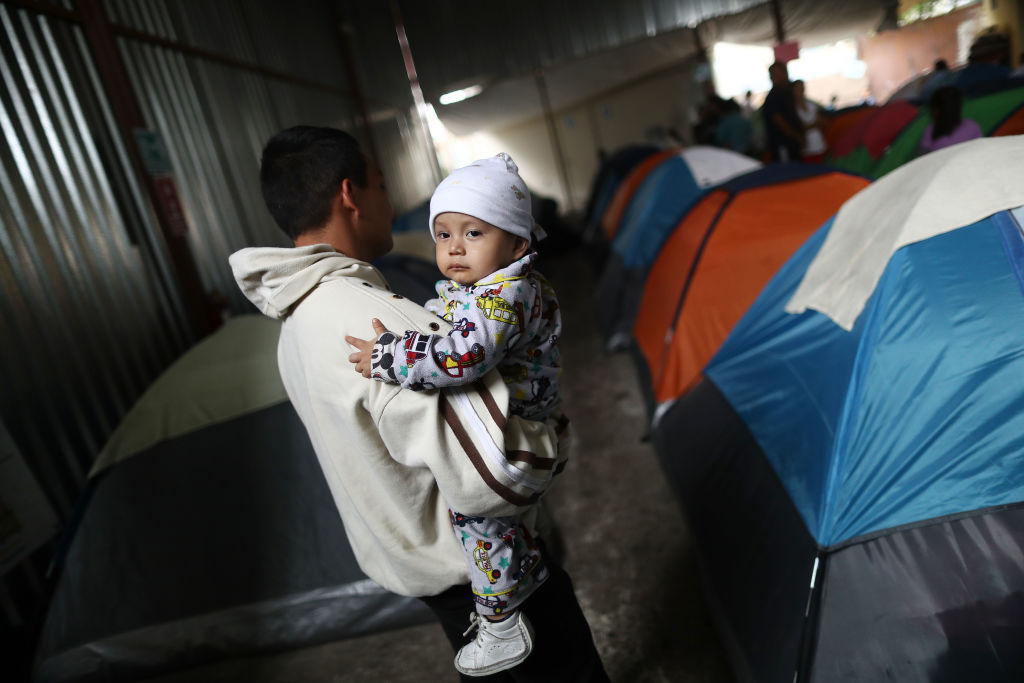Biden's Immigration Battle
Trump’s Legacy: What’s Reversible, What’s Not
Joe Biden’s biggest challenge lies at the U.S.-Mexico border, where an estimated 67,000 migrants are stranded.

When Joe Biden takes his oath of office outside the U.S. Capitol building on January 20, he will inherit an immigration system transformed by the hardline agenda of Donald Trump. The new president-elect has vowed to undo nearly all of the 450 “irresponsible and inhumane” executive actions of the Trump administration. These range from sweeping measures like the Muslim travel ban, the separation of children from their parents at the border and erecting a southwestern border wall, to the petty, such as rejecting citizenship claims because an application form had been left blank in parts.
The first law of holes is to stop digging, and migrants, immigration advocates and public intellectuals have celebrated Biden’s victory firstly because he is unlikely to dig the hole any deeper. Experts say the test for Biden will be if his administration can fill in the holes fast enough to hold his coalition together.
“It’s unlikely [the new administration is] going to have the ability to reverse all the Trump changes, and that’s going to be hard for people to swallow or to understand.”
— Sarah Pierce, Migration Policy Institute
The higher profile, procedurally simple changes will be the easiest to do away with, says Sarah Pierce, a lawyer and policy analyst at the nonpartisan Migration Policy Institute. Other changes like a wealth test on green-card applicants, known as the public charge rule, require issuing a new regulation and will likely get hung up on time-consuming procedural factors.
“It’s unlikely they’re going to have the ability to reverse all the Trump changes, and that’s going to be hard for people to swallow or to understand,” Pierce said.
See Other Stories in this Series
Both wings of the Democratic Party, however, welcome the return to institutional norms represented in Biden’s nomination of Alejandro Mayorkas as the head of the Department of Homeland Security. Mayorkas, who came to the U.S. as a political refugee from Cuba, previously led U.S. Citizenship and Immigration Services during the Obama administration, and then was deputy secretary of DHS.
Mayorkas, an expert in Byzantine policy matters, oversaw the creation of the Deferred Action for Childhood Arrivals (DACA) program, an Obama-era executive action rescinded by Trump in 2017 that shielded from deportation about 650,000 youths who came to the country illegally as children. Biden has pledged to reinstate the program within his first 100 days in office.
The incoming president has not said what he plans to do with the tens of thousands of asylum-seekers living in limbo in crowded shelters and makeshift camps along the border.
The biggest challenge in store for the Biden administration lies at the U.S.-Mexico border, where an estimated 67,000 migrants are stranded in Mexican cities awaiting asylum hearings in U.S. immigration courts. In Tijuana, migrants were “ecstatic” at the results of the elections, said Erika Pinheiro, the litigation director of Al Otro Lado, which provides free legal representation to asylum-seekers in the sprawling border metropolis.
“The assumption was it’s over if Trump gets reelected, and there’s some hope if Biden is elected. Though depending on who you talk to, the expectations vary.” Pinheiro is involved in discussions with policymakers over rescinding the Trump-era program known the Migrant Protection Protocols (MPP), which forces asylum-seekers back to Mexico.
* * *
On border security, the Trump administration has worked tirelessly to seal off the southern border to asylum-seekers — an effort supercharged by the pandemic. Since March, the administration has used an order from the Centers for Disease Control and Prevention to turn away migrants before they have a chance to apply for asylum. Like many Trump immigration policies, both the COVID-era health decree and the MPP can be easily undone with the stroke of Biden’s pen. The question threatening a rift between liberal and moderate Biden supporters is, should they?
Biden says he will rescind the MPP — also known as Remain in Mexico — but the incoming president has not said what he plans to do with the tens of thousands of asylum-seekers living in limbo in crowded shelters and makeshift camps along the border.
If there is a surge in Central American migrants to the border, how will the new administration handle it?
Advocates want those who meet the qualifications let into the country and paroled. But former top immigration officials under President Obama warn that appearing too lenient too quickly could set off a northward stampede to the border. A recent surge in border crossings is expected to intensify in the coming months.
“If you let these 67,000 people into the country all at once, then what do you do with the next 67,000 that show up?” said Alan Bersin, assistant secretary for international affairs and chief diplomatic officer in the Department of Homeland Security’s Office of Policy under Obama. “There are ways to do it gradually over time.”
Push factors driving migrants northward to the border have only gotten worse in Mexico and Central America during the COVID crisis. Economies are battered from shutdowns and extreme weather events. Coffee rust has blighted the crops farmers rely on in Guatemala. Hundreds of Hondurans devastated by a pair of hurricanes gathered to walk in a caravan to the U.S. in December. Homeland Security officials have been preparing for a surge in Central American migrants to the border since Election Day. If there is a surge, how will the new administration handle it?
“The administration needs to make a decision whether to focus on the political optics or the human rights of people who are migrating.”
— Erika Pinheiro, Al Otro Lado
Biden has promised to dispatch additional asylum officers to review the cases of recent border crossers and keep cases with positive credible-fear findings with the United States Citizenship and Immigration Services, alleviating the burden on immigration courts. Similarly, Biden will double the number of immigration judges, court staff and interpreters in an effort to clear a backlog of more than 1 million immigration cases in the administrative system.
“If you’re going to abandon MPP you have to flood the zone with the rule of law,” said John Sandweg, a former acting director of Immigration and Customs Enforcement under President Obama. “The administration will rightfully be concerned with the perception we’ve lost the integrity of the border, and an asylum surge can create that perception quickly.”
* * *
At least one hot button change from the Trump era may continue to serve a purpose for Biden: the idea that the U.S. cannot wait until migration flows arrive at its southern border to act. Trump enlisted substantial assistance from Mexican President Andrés Manuel López Obrador to restrain Central American migration across Mexico’s southern border. López Obrador additionally agreed to accept the return from the United States of asylum applicants to wait in Mexico for the adjudication of their petitions. Trump also signed agreements with Guatemala, El Salvador and Honduras to require migrants on their way to the U.S. to apply for protections in those countries first.
Biden says he will reassert America’s commitment to asylum-seekers and refugees, but he has not said what he plans to do about the cooperation with Mexico and the series of bilateral agreements with the Northern Triangle countries of Guatemala, Honduras and El Salvador. Bersin, the Obama-era DHS official, says that while the Trump-era agreements were designed to stifle asylum claims, they should be maintained for six to 12 months to avoid having the president-elect confronted with a full-blown border crisis when he takes office in January.
“This can be accomplished while planning and preparing for a transition to a revised policy approach that incorporates both humanitarian values and a measured deterrent to irregular migration,” Bersin says.
From Tijuana, Erika Pinheiro is discussing with the Biden transition team relief possibilities for parents separated from their children at the border. She commended Biden’s commitment to end Remain in Mexico, broaden access to the asylum process and reunify families that were separated. But January 20 is at hand, and confusion reigns among migrants stuck in Mexico. “The administration needs to make a decision whether to focus on the political optics or the human rights of people who are migrating,” she said.
Copyright 2021 Capital & Main

-

 Latest NewsFebruary 3, 2026
Latest NewsFebruary 3, 2026Amid the Violent Minnesota Raids, ICE Arrests Over 100 Refugees, Ships Many to Texas
-

 Featured VideoFebruary 4, 2026
Featured VideoFebruary 4, 2026Protesters Turn to Economic Disruption to Fight ICE
-

 Column - State of InequalityFebruary 5, 2026
Column - State of InequalityFebruary 5, 2026Lawsuits Push Back on Trump’s Attack on Child Care
-

 Column - California UncoveredFebruary 6, 2026
Column - California UncoveredFebruary 6, 2026What It’s Like On the Front Line as Health Care Cuts Start to Hit
-

 The SlickFebruary 10, 2026
The SlickFebruary 10, 2026New Mexico Again Debates Greenhouse Gas Reductions as Snow Melts
-

 Latest NewsFebruary 12, 2026
Latest NewsFebruary 12, 2026Trump Administration ‘Wanted to Use Us as a Trophy,’ Says School Board Member Arrested Over Church Protest
-

 Latest NewsFebruary 10, 2026
Latest NewsFebruary 10, 2026Louisiana Bets Big on ‘Blue Ammonia.’ Communities Along Cancer Alley Brace for the Cost.
-

 Column - State of InequalityFebruary 12, 2026
Column - State of InequalityFebruary 12, 2026They’re Organizing to Stop the Next Assault on Immigrant Families

